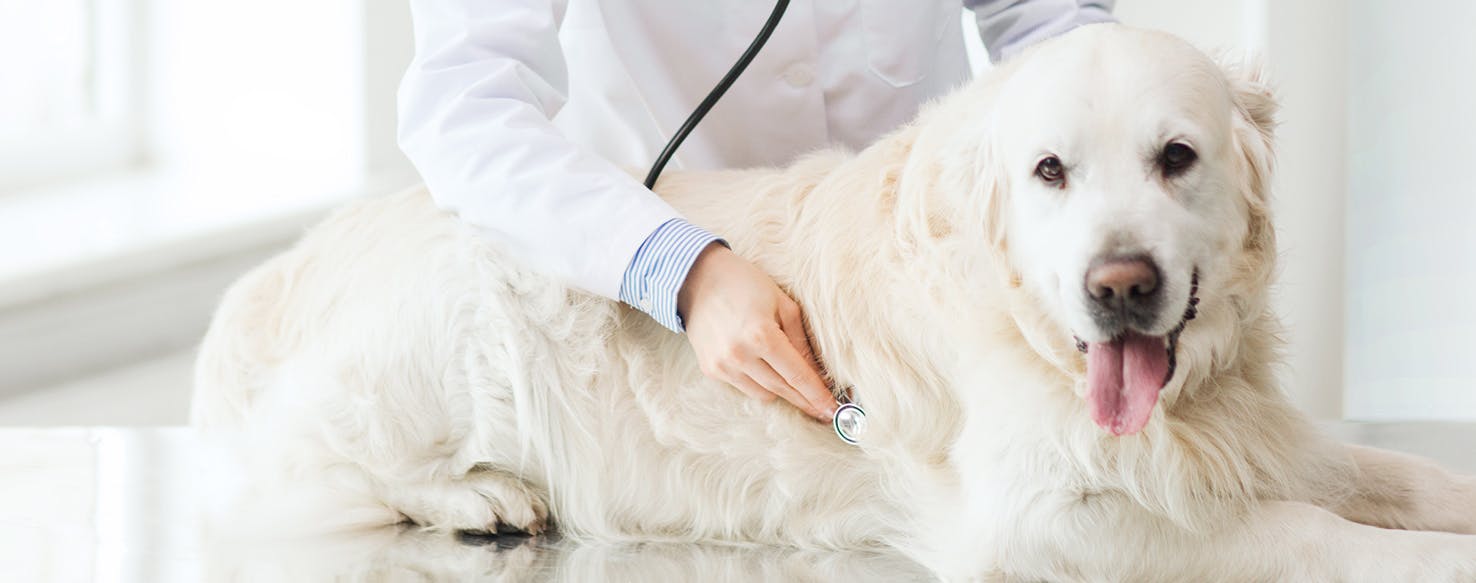
By Amy Caldwell
Published: 09/15/2017, edited: 11/17/2021
Save on pet insurance for your pet
You don't have to choose between your pet and your wallet when it comes to expensive vet visits. Prepare ahead of time for unexpected vet bills by finding the pawfect pet insurance.
The functioning of your dog’s heart is critical to supplying adequate blood and oxygenation to your dog’s body tissues. Any condition affecting the heart’s functioning, therefore, can be very serious and life-threatening.
Your dog's aorta carries blood from the heart to the body tissues. If the aorta narrows due to fibrous tissue build up, the flow of blood from the heart can be impeded and adversely affect heart functioning. Aortic stenosis can range from mild, which may be managed with care and does not require invasive medical intervention, to severe, requiring surgical correction or resulting in congestive heart failure and death. Read on for more information on care and treatment of a dog with aortic stenosis.
What is Aortic Stenosis?
Aortic stenosis occurs when the aorta, which carries blood away from the heart, narrows, resulting in the left ventricle of the heart failing to empty as it should to allow normal heart functioning.
Narrowing of the aorta can occur in three places:
Narrowing of the aorta can occur in three places:
■ Below the aortic valve, close to the heart (subaortic)
■ At the aortic valve (valvular)
■ Above the aortic valve, away from the heart (supravalvular)
■ At the aortic valve (valvular)
■ Above the aortic valve, away from the heart (supravalvular)
The narrowing is caused by the growth of fibrous tissue forming a ring or node that slows the flow of blood exiting the left ventricle. This condition is more common in certain large breed dogs such as Golden Retrievers, Great Danes, Rottweilers, Samoyeds, Bouvier Des Flandres, German Shepherds, Boxers, and Newfoundlands, and usually manifests at birth or in the first year of life. Dogs with aortic stenosis may exhibit weakness, difficulty breathing or loss of consciousness (fainting). A veterinarian will diagnose this condition by listening to your dog's heart and conducting an electrocardiogram and chest x-ray.
Because aortic stenosis is a genetic condition, dogs exhibiting this disorder should be removed from breeding programs.
Caring for a Dog with Aortic Stenosis
If aortic stenosis is mild to moderate, there are steps pet owners can take to care for a dog with this condition.
■ Dogs with mild to moderate aortic stenosis may not be good candidates for anesthetic.
■ Medical procedures requiring general anesthetic should be avoided or steps taken to mitigate the risk of anesthetic if required.
■ Exercise should be moderate and not stressful, or extreme exercise not permitted.
■ Keep your dog from situations in which they can become over-excited or stressed, which results in an increased heart rate.
■ Medication such as beta-blockers and calcium channel blockers, which decrease and keep heart rate regular and moderate, will help mitigate this condition.
■ A healthy diet with low sodium to support heart function should be provided.
■ Regular monitoring of your dog's condition to ensure their overall health will be required of both you and your veterinarian.
■ If moderate to severe aortic stenosis is present, surgical intervention such a balloon catheterization to reduce the obstruction in the aorta, or removal of the tissue blocking the aorta, may be attempted.
■ Medical procedures requiring general anesthetic should be avoided or steps taken to mitigate the risk of anesthetic if required.
■ Exercise should be moderate and not stressful, or extreme exercise not permitted.
■ Keep your dog from situations in which they can become over-excited or stressed, which results in an increased heart rate.
■ Medication such as beta-blockers and calcium channel blockers, which decrease and keep heart rate regular and moderate, will help mitigate this condition.
■ A healthy diet with low sodium to support heart function should be provided.
■ Regular monitoring of your dog's condition to ensure their overall health will be required of both you and your veterinarian.
■ If moderate to severe aortic stenosis is present, surgical intervention such a balloon catheterization to reduce the obstruction in the aorta, or removal of the tissue blocking the aorta, may be attempted.
Aortic stenosis in dogs, which impedes the drainage of blood from the heart's left ventricle, is a serious medical disorder involving the heart. Pet owners can take steps to care for and support dogs with the condition, including providing medication and appropriate diet, and reducing exercise and stress to manage the condition. In some cases, surgical intervention may be required to mitigate the condition and open the channel that carries blood away from the heart. Careful monitoring of the condition by you and your veterinarian will be required to successfully manage this potentially life-threatening condition.
You may also like
